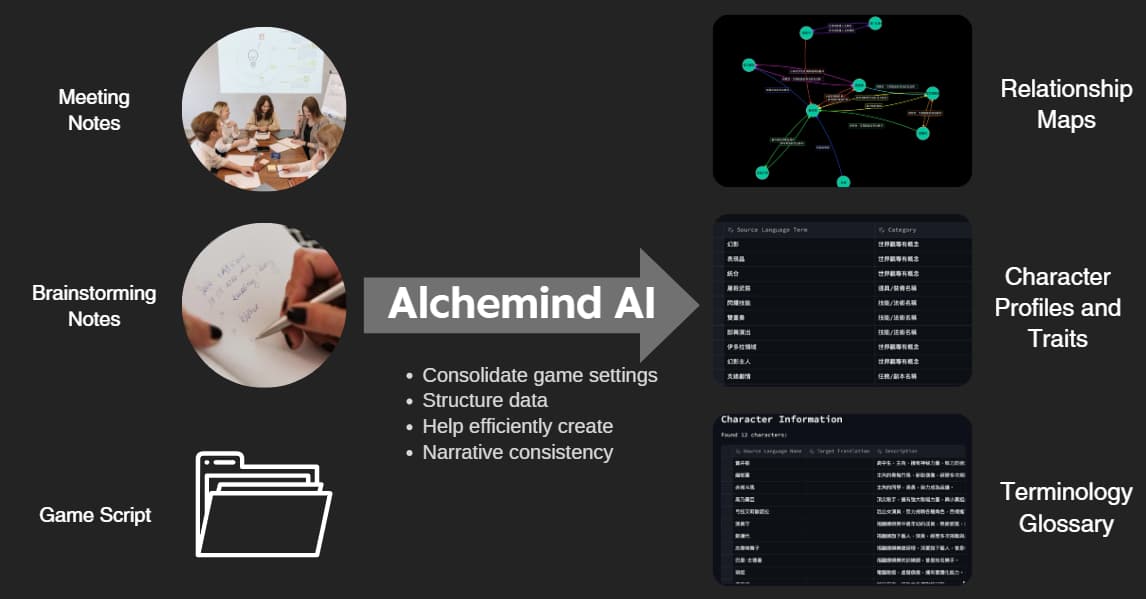
Game translation is the most crucial step for developers aiming to enter the international market.
In the past, translating a 100,000-word game into a single language typically required a budget of around $10,000, which was a heavy burden, especially for indie developers.
With the rise of AI technology, more developers are exploring how AI can assist in video game localization.
For short-text games (e.g., lightweight dialogue-based games), Prompt Engineering can already deliver decent results.
However, for long-form narrative games (e.g., RPGs, visual novels), prompts alone are not enough due to:
- Context length limitations of large language models
- The probabilistic and unstable nature of generative AI
- Difficulty in fully describing complex contexts via prompts
That said, AI still holds tremendous potential in game translation and localization. The key challenge lies in designing additional workflows or context engineering to overcome these limitations.
-
Challenges of Applying AI in Game Translation
When using AI for video game translation, developers often face the following issues:
1. Insufficient Context Understanding & AI Hallucinations
AI may overlook context or generate extra content that doesn’t exist, leading to mistranslations.
2. Inconsistent Character Traits
Character personality, tone, or gender may shift inconsistently across different parts of the text.
3. Inconsistent Terminology & Worldbuilding
Developer-created terms (e.g., skills, items) are often translated differently throughout the game, breaking consistency.
4. Overly Long Translations
AI may generate translations that exceed UI constraints, causing text to overflow in dialogue boxes or menus.
5. Sensitive Content Filtering
Violent, gory, or adult content is often blurred, softened, or censored due to AI safety filters.
6. Missing Details, Difficult Proofreading
Unstable AI output may omit critical details, making human proofreading costly and time-consuming.
7. Difficulty Handling Variables
Game texts often include variables or placeholders (e.g., {player_name}), which AI may delete or alter, requiring manual fixes.
-
Alchemind AI — Built for Game Translation
As both gamers and AI engineers, we interviewed multiple developers and localization professionals before designing Alchemind AI.
Our core philosophy: “Understand first, then translate.”
Alchemind AI provides two major functions tailored to game translation workflows:
Worldbuilding Support
Developers can use the worldbuilding module to support narrative design. Our AI agent can consolidate developer input (drafts, meeting notes, brainstorming notes) into structured data, including:
- Character profiles and traits
- Relationship maps
- Custom terminology lists

This structured foundation ensures narrative consistency and becomes essential reference material for game translation, minimizing hallucinations and errors.
Game Script Translation
Once the script is complete, developers can use Alchemind AI’s game script translation feature. Supported by workflow design and specialized language models, it provides:
- Automatic recognition of variables and placeholders
- Translation length control to fit UI constraints
- Game-specific translation models that support different styles, including sensitive genres (violence, gore, adult content)
By combining context engineering with game-specialized models, Alchemind AI achieves a level of translation quality that general-purpose AI tools cannot.
-
The All-in-One Assistant for Game Translation: Advantages of Alchemind AI
Beyond translation, Alchemind AI also offers additional benefits:
1. Improved Cross-Team Communication
Traditionally, working with professional translators required extensive communication to explain the game’s worldbuilding, characters, and terminology.
With Alchemind AI, developers can generate structured worldbuilding documents to share with publishers, proofreaders, and marketing teams — reducing misunderstandings and communication overhead.
2. Preserving Details for Easier Proofreading
Because translations retain maximum detail, human proofreaders can work faster and more effectively, lowering costs.
3. Proofreading & LQA Support
After AI translation, we provide an additional AI-based proofreading system. For developers who prefer human involvement, we also offer referrals to professional translators for proofreading and LQA.
-
Conclusion
While today’s AI cannot yet perfectly solve every challenge in game localization, it can be greatly enhanced with context engineering and workflow design.
Alchemind AI was built precisely to address these needs — from worldbuilding to full multilingual translation — offering developers a reliable, all-in-one platform.
Our mission is to become the best assistant for game developers worldwide, helping more great games reach international audiences.